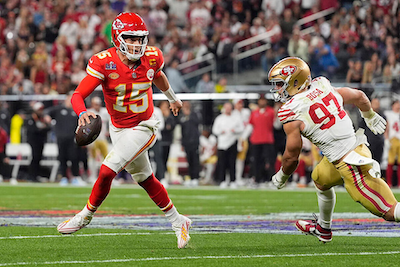|
Chiefs Repeat as Super Bowl Champs with 25–22 OT Victory
February 11, 2024
The Kansas City Chiefs repeated as Super Bowl champions, defeating the San Francisco 49ers 25–22 on a touchdown in overtime. Chiefs Quarterback Patrick Mahomes directed his team on a must-score drive, capping it with a -yard pass to Mecole Hardman in the end zone for the game-ending touchdown. Mahomes was named the Super Bowl MVP. He was 34-of-46 passing for 333 yards and two touchdowns. He threw one interception. He was instrumental in his team's winning drive, completing eight passes and rushing for 27 yards. It was the first postseason played under a new set of overtime rules. Because both teams were tied at the end of four quarters, they essentially started over, with the possibility of playing four more (regular) 15-minute quarters if neither team scored. However, the situation changes if one team scores. Unlike in previous years, when the first team to score in overtime would have won the game, the other team gets the ball after one team scores and then must score on that possession. If the score is again tied after each team has scored, then the next team to score wins. However, if the second team scores more points than the first team did, then the team with the most points wins. That is what happened in Super Bowl LVIII. San Francisco quarterback Brock Purdy drove his team down the field deep into Kansas City territory, but the Chiefs defense came up big on a 3rd & 4 play, forcing the 49ers to kick a field goal. That made the score 22–19. At that point, the Chiefs had to score. They had to keep gaining first downs, even going for it on fourth down if they had to. They did have to at one point, succeeding on a 4th & 2. A handful of plays later, Mahomes found for the winning score. The 49ers led 10–3 at the half. They scored a touchdown on a trick play, a pass from Purdy to wide receiver Jauan Jennings to running back Christian McCaffrey, who scampered 21 yards for the score. Jake Moody, the San Francisco kicker, had earlier nailed a 55-yard field goal, setting a Super Bowl record in the process. The only Chiefs score in the first half was a 28-yard field goal completed by Kansas City kicker Harrison Butker (who had kicked the game-winning field goal in his team's victory in 2023).
In the third quarter, the Chiefs drove toward the end zone again but were stalled, settling for another field goal from Butker, this one of 57 yards, breaking the Super Bowl record that his counterpart, Moody, had set not long before that. A 49ers fumble on a punt gave the Chiefs the ball deep in San Francisco territory, and Mahomes found Marquez Valdes-Scantling for a touchdown, putting the Chiefs up 13–10. A fourth-quarter drive by San Francisco ended with a 10-yard touchdown pass from Purdy to Jennings. However, a rare blocked extra point by Chief linebacker Leo Chenal made the score 16–13, meaning that the Chiefs could tie the game with a field goal. They did just that, ending a drive with another field goal from Butker. The kicking game continued, as the team exchanged field goals, a 53-yarder from Moody that put the 49ers up 19–16 and then a game-tying 27-yard field goal from Butker. The game then went to overtime. The 49ers won the overtime coin toss and elected to receive. They had success running the ball, taking advantage of the tiring Kansas City defense. But the drive stalled at the Chiefs' 9-yard line on an incomplete pass on 3rd & 4. Moody dutifully hit a 27-yard field goal, and it was the Chiefs' turn to try to score. They did so, Mahomes capping off an efficient drive with a touchdown pass that won the game. It was the Chiefs' third Super Bowl win in the past five years. They defeated the 49ers 31–20, and then lost 31–9 to Tampa Bay the following year. Last year, it was the last-second win over the Eagles. |
Social Studies for Kids |
Social Studies for Kids
copyright 2002–2024
David White





